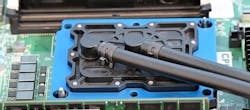Focus on Data Center Power and Cooling Investment Tightens: Flex, Eaton, Bloom Energy, Oklo
Acquisitions, purchase agreements and investments in new technologies continue to be highlights of what the data center industry is doing while continuing to invest in the construction of new facilities.
The need to improve energy efficiency, increase power availability, and make data centers more sustainable and green weighs heavily on how the industry is approaching new technologies.
Flex Acquires JetCool After Announcing Planned Partnership
Flex has officially acquired liquid cooling solution provider JetCool Technologies to enhance its capabilities in addressing the increasing demands of hyperscale and enterprise AI infrastructures.
This strategic acquisition was announced November 14 and follows the companies' earlier collaboration announcement at the 2024 OCP Global Summit.
By integrating JetCool's cutting-edge cooling technology, Flex aims to bolster its data center and power portfolio, helping customers tackle the challenges of power consumption, heat management, and scalability in the AI era.
Flex has been active this quarter with efforts consolidate its position in the data center and industrial segments. Earlier this fall, we saw the company acquire Crown Technical Systems to shore up its influence in the markets for modular data centers and power distribution.
JetCool, established in 2019, specializes in microconvective cooling, offering solutions like fully sealed cold plates, liquid-to-chip products, and embedded liquid cooling systems. Their recent product announcements include a scalable Coolant Distribution Unit (CDU) that can cool racks up to 300kW and extend to over 2MW for row-based setups.
These technologies are already deployed by chipmakers and OEMs, helping optimize performance and sustainability in high-performance computing.
Michael Hartung, Flex's President and Chief Commercial Officer, emphasized that JetCool's technology will significantly enhance Flex’s ability to support AI workloads, stating:
The addition of JetCool's advanced liquid cooling technology strengthens our ability to help customers address increased power, thermal density, and cooling requirements across the full spectrum of AI workloads and high-performance computing for greater performance, efficiency, and sustainability.
Dr. Bernie Malouin, CEO of JetCool, expressed enthusiasm about the expanded opportunities the acquisition brings his company, in terms of leveraging Flex's global manufacturing and integration capabilities to deliver efficient, scalable liquid-cooled systems.
Eaton Announces Self-Cooling Rack for Edge Deployments
Eaton has introduced its new SmartRack 5.5 kW self-cooling server rack, a high-capacity in-rack cooling solution available in North America, aimed at supporting edge computing and micro data centers.
This self-cooling rack is designed to cool IT equipment efficiently in environments such as server rooms, edge locations, and network closets, which generally lack comprehensive cooling facilities.
Use of the self-cooling rack is aimed at ensuring reliability and preventing equipment failures caused by overheating.
Supporting up to 5.5 kW and featuring closed-loop cooling, variable fan speeds, a built-in evaporator, and insulated doors for optimized cooling, the rack potentially eliminates the need for traditional aisle or HVAC-based cooling systems, resulting in reduced costs and simplified deployment.
The rack includes a 12U cooling unit pre-installed at the bottom of a custom 42U rack, reducing installation time by not requiring HVAC specialists to be part of the rack deployment.
Additionally, the unit integrates a network management card compatible with Eaton’s Distributed IT Performance Management software and Environmental Monitoring Probe, enabling temperature and humidity monitoring.
It also features a 7-inch touchscreen LCD display to simplify local diagnostics and control. For emergencies, built-in ventilation prevents overheating in case of power outages.
This new rack joins Eaton’s existing 3.5 kW top-of-rack unit, providing customers greater flexibility in managing heat-sensitive IT workloads in edge environments.
Bloom Energy Sees Its Largest Fuel Cell Order
As American Electric Power takes a legislative approach to get control of data center power in central Ohio, it also makes a large commitment to renewable power, with a landmark agreement between AEP and Bloom Energy for the procurement of up to 1 GW of Bloom’s advanced fuel cell technology.
This deal represents the largest commercial fuel cell procurement in history, with an initial order of 100 MW, and with further expansions anticipated in 2025.
The initial installations under this agreement will focus on central Ohio, where AEP is set to deploy Bloom’s fuel cells to power AI-driven data centers, and where AEP has had a moratorium on additional data centers due to power considerations.
The high-density power installations, accounting for 100 MW per acre, will deliver a combination of high efficiency, reliability, and lower emissions, which are crucial for data centers aiming to optimize performance, while reducing their environmental impact.
The fuel cells to be deployed are well into commercial production, as highlighted by KR Sridhar, Founder, Chairman, and CEO of Bloom Energy, who stated:
We are thrilled to be working with AEP as they lead the charge to bring innovative solutions to the transforming electricity market. With our proven track record of more than 1.3 GW deployed, and a fully functional factory that can deliver GWs of products per year, we are ready and able to meet this rapid electricity demand growth.
This is the second major installation announced by Bloom in recent weeks, with an 80 MW project in Korea described below.
Oklo Receives Letters of Intent for up to 750 MW of Data Center Power
While not identifying the customer, Oklo has announced that they have received Letters of Intent (LOI) that look for up to 750 MW of data center power, bringing customer commitments for the yet undelivered small modular reactor (SMR) nuclear power plants to 2100 MW.
Oklo has this year been steadily gathering such LOIs. In April, we reported that Equinix had committed $25 million for forthcoming Oklo nuclear SMRs to power it expanding hyperscale footprint. And in May, we saw Oklo forge a 20-year nuclear power purchase agreement (PPA) with Prometheus Hyperscale for 100 MW of forthcoming data center power.
Identifying its new customer only as “one of the fastest-growing data center companies,” Oklo said it will deploy its SMRs into select, as yet unidentified markets, meeting the data center operator's need for sustainable, reliable, low-carbon, renewable power.
Regarding the LOIs and projected deployments, Jacob DeWitte, Co-Founder and CEO of Oklo, said:
The strong customer response reflects confidence in Oklo’s clean, reliable, and affordable power solutions. Our approach helps enable customers to scale sustainably with reliable power aligned to their long-term goals.” By building, owning, and operating each powerhouse, Oklo makes it easier for customers to adopt nuclear power generation while creating a steady revenue stream for Oklo by selling power, not power plants.
About the Author



